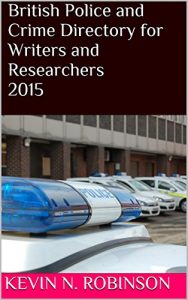The updated and expanded 2016 edition is also available on Amazon, so make sure you are buying the best one for your needs.
About the Author
With over 30 years UK and International policing experience the author has produced this essential, unique and reliable resource for writers and researchers who want to know more about the police in Britain and how they go about their business of preventing, investigating and detecting crime. He is a well-established and highly respected adviser to authors around the world, who want to get their facts straight and their stories credible/realistic.
About the Book
The British Police and Crime Directory for Writers and Researchers is the police adviser on your tablet/computer/phone. It is an easy-to-use launch pad for learning more about the police, policing methods and crime investigation.
The five parts of the book look at:
•How to make contact with a particular UK police force, agency or associated government department.
•What information can be provided to the writer/researcher, how and by whom?
•Where to locate (free of charge) some of the very same practice guides the police use to investigate serious and serial crime as well as over 200 other manuals and documents that examine and describe how the police should work in the following categories:
oRecruitment and Training
oCrime and Investigation
oCustody and Detention Matters
oFirearms and Public Order Policing
oForensics
oIncidents and the Police National Computer and Database
oIntelligence Matters
oInterviewing
oLegislation
oMissing Persons and Children
oOther Law Enforcement Agencies
oOverseas Matters
oPersonal Protective Equipment
oPublications about the Police
•Which 100 websites every writer and researcher should know about?
•Where to find 37 authentic video clips describing ways in which the police really work, including following a murder investigation from start to finish and finally
•Which 58 books about the police, policing, crime and writing crime fiction may the writer and researcher find useful?
In a nutshell, you’ll be able to learn about how to become a police officer: what the application process consists of: what the role entails: what training courses officers can undertake: what technology is available to aid investigations: how an arrest is carried out along with what powers the police have: the procedures they should follow and how they should conduct their investigations and interviews.
You will find who within a police force or associated agency can help you: how you can legally obtain information from them: explanations of some of the terminology used: You can also discover how public order and firearms incidents should be policed as well as how missing persons’ investigations should be conducted.
The book will prove indispensable to those wishing to bring authenticity and realism to their writing to create a convincing, believable story.
With the aid of this comprehensive directory, your readers will not be questioning your facts or research methods but will focus on the heart of the matter - "whodunit"?
About the Author
With over 30 years UK and International policing experience the author has produced this essential, unique and reliable resource for writers and researchers who want to know more about the police in Britain and how they go about their business of preventing, investigating and detecting crime. He is a well-established and highly respected adviser to authors around the world, who want to get their facts straight and their stories credible/realistic.
About the Book
The British Police and Crime Directory for Writers and Researchers is the police adviser on your tablet/computer/phone. It is an easy-to-use launch pad for learning more about the police, policing methods and crime investigation.
The five parts of the book look at:
•How to make contact with a particular UK police force, agency or associated government department.
•What information can be provided to the writer/researcher, how and by whom?
•Where to locate (free of charge) some of the very same practice guides the police use to investigate serious and serial crime as well as over 200 other manuals and documents that examine and describe how the police should work in the following categories:
oRecruitment and Training
oCrime and Investigation
oCustody and Detention Matters
oFirearms and Public Order Policing
oForensics
oIncidents and the Police National Computer and Database
oIntelligence Matters
oInterviewing
oLegislation
oMissing Persons and Children
oOther Law Enforcement Agencies
oOverseas Matters
oPersonal Protective Equipment
oPublications about the Police
•Which 100 websites every writer and researcher should know about?
•Where to find 37 authentic video clips describing ways in which the police really work, including following a murder investigation from start to finish and finally
•Which 58 books about the police, policing, crime and writing crime fiction may the writer and researcher find useful?
In a nutshell, you’ll be able to learn about how to become a police officer: what the application process consists of: what the role entails: what training courses officers can undertake: what technology is available to aid investigations: how an arrest is carried out along with what powers the police have: the procedures they should follow and how they should conduct their investigations and interviews.
You will find who within a police force or associated agency can help you: how you can legally obtain information from them: explanations of some of the terminology used: You can also discover how public order and firearms incidents should be policed as well as how missing persons’ investigations should be conducted.
The book will prove indispensable to those wishing to bring authenticity and realism to their writing to create a convincing, believable story.
With the aid of this comprehensive directory, your readers will not be questioning your facts or research methods but will focus on the heart of the matter - "whodunit"?






